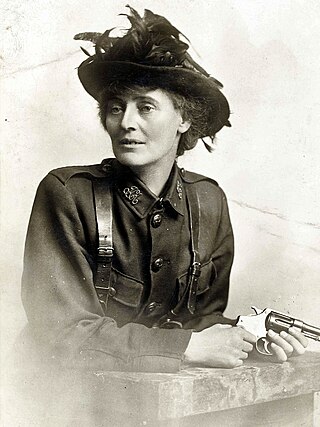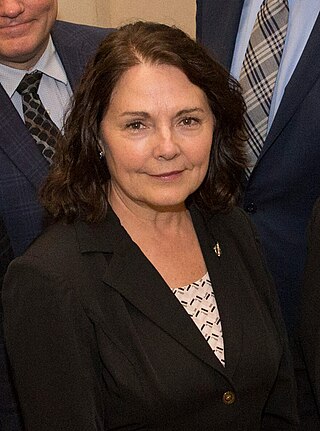Related Research Articles
The Progressive Party of Canada, formally the National Progressive Party, was a federal-level political party in Canada in the 1920s until 1930. It was linked with the provincial United Farmers parties in several provinces, and it spawned the Progressive Party of Saskatchewan, and the Progressive Party of Manitoba, which formed the government of that province. The Progressive Party was part of the farmers' political movement that included federal and provincial Progressive and United Farmers' parties.

The Social Credit Party of Canada, colloquially known as the Socreds, was a populist political party in Canada that promoted social credit theories of monetary reform. It was the federal wing of the Canadian social credit movement.

Irene R. Mathyssen is a Canadian politician and was a Member of Parliament in the House of Commons of Canada from 2006 until 2019. She was previously a New Democratic Party Member of Provincial Parliament (MPP) in Ontario from 1990 to 1995, and briefly served as a minister in the government of Premier Bob Rae.

Edmonton Strathcona is a federal electoral district in Alberta, Canada, that has been represented in the House of Commons of Canada since 1953. It spans the south-central part of the city of Edmonton. In the periods 2008–2015 and 2019–2021, during the 40th, 41st, and 43rd Canadian Parliaments, Edmonton Strathcona was the only federal riding in Alberta not represented by the Conservative Party.
The Liberal–Labour banner has been used several times by candidates in Canadian elections:

The 1940 Canadian federal election was held March 26, 1940, to elect members of the House of Commons of Canada of the 19th Parliament of Canada. Prime Minister William Lyon Mackenzie King's Liberal Party was re-elected to their second consecutive majority government.
Paul Eugene Forseth is a Canadian politician, who was a member of Parliament for British Columbia from 1993 to 2006.

Françoise Boivin is a Canadian politician, who represented the electoral district of Gatineau in the House of Commons of Canada until 2015.

The 39th Canadian Parliament was in session from April 3, 2006 until September 7, 2008. The membership was set by the 2006 federal election on January 23, 2006, and it changed only somewhat due to resignations and by-elections. The Parliament was dissolved on September 7, 2008, with an election to determine the membership of the 40th Parliament occurring on October 14, 2008.
An independent, non-partisan politician or non-affiliated politician is a politician not affiliated with any political party or bureaucratic association. There are numerous reasons why someone may stand for office as an independent.
Representation by women has been a significant issue in Canadian politics since 1900.

Harold Glenn Albrecht was the Member of Parliament (MP) for the Conservative Party of Canada in the riding of Kitchener—Conestoga from 2006 until 2019. He defeated the incumbent Liberal MP, Lynn Myers, by just over 1,000 votes in the 2006 federal election to gain a seat in the House of Commons of Canada.
Upon the dissolution of the 39th Canadian Parliament, 65 of the 308 seats were held by women. Canada ranks 45th in the world in representation of women in the national lower house.

The representation of women in the House of Commons of the United Kingdom has been an issue in the politics of the United Kingdom at numerous points in the 20th and 21st centuries. Originally debate centred on whether women should be allowed to vote and stand for election as Members of Parliament. The Parliament Act 1918 gave women over 21 the right to stand for election as a Member of Parliament. The United Kingdom has had three female Prime Ministers: Margaret Thatcher (1979–1990), Theresa May (2016–2019), and Liz Truss (2022). The publication of the book Women in the House by Elizabeth Vallance in 1979 highlighted the under-representation of women in Parliament. In more modern times concerns about the under-representation of women led the Labour Party to introduce and, decades later, abandon all-women short lists, something which was later held to breach discrimination laws.
The 41st Canadian Parliament includes a record number of female Members of Parliament, with 76 women elected to the House of Commons of Canada in the 2011 election. This represents a gain of seven seats over the previous record of 69 women in the 40th Canadian Parliament. By contrast, the 112th United States Congress had 72 women sitting in the 435-seat United States House of Representatives, and the 113th United States Congress has 81.

Cathay Wagantall is a Canadian politician who was elected as a Member of Parliament in the House of Commons of Canada to represent the federal electoral riding of Yorkton—Melville during the 2015 Canadian federal election.
The 42nd Canadian Parliament includes a record number of female Members of Parliament, with 88 women elected to the 338-member House of Commons of Canada (26%) in the 2015 election. This represents a gain of twelve seats over the previous record of 76 women in the 41st Canadian Parliament. By contrast, the 114th United States Congress had 105 women sitting in the 435-seat United States House of Representatives.
The number of women sitting in the House of Commons remained at five during the 25th Canadian Parliament; the number of women senators remained at six. 26 women ran for seats in the Canadian House of Commons in the 1962 federal election; four women out of five incumbents were reelected. Margaret Aitken was defeated when she ran for reelection; Isabel Hardie became the first woman elected to the House of Commons from the Northwest Territories.
The 43rd Canadian Parliament once again set a record number of female Members of Parliament, with 98 women elected to the 338-member House of Commons of Canada (28.9%) in the 2019 election. Of those 98 women, 31 were elected for the first time in the 2019 election. 2 more women were elected in by-elections in October 2020, reaching the historic milestone of 100 women in the House of Commons for the first time. This represents a gain of twelve seats over the previous record of 88 women in the 42nd Canadian Parliament. By contrast, the 116th United States Congress had 102 women sitting in the 435-seat United States House of Representatives (23.4%).
The 44th Canadian Parliament includes a record number of female Members of Parliament, with 103 women elected to the 338-member House of Commons of Canada (30.5%) in the 2021 election. Of those 103 women, 22 were elected for the first time in the 2021 election. This represents a gain of five seats over the previous record of 98 women elected at the beginning of the 43rd Canadian Parliament, and a gain of three seats from the record high of 100 women during the previous parliamentary session following by-elections.